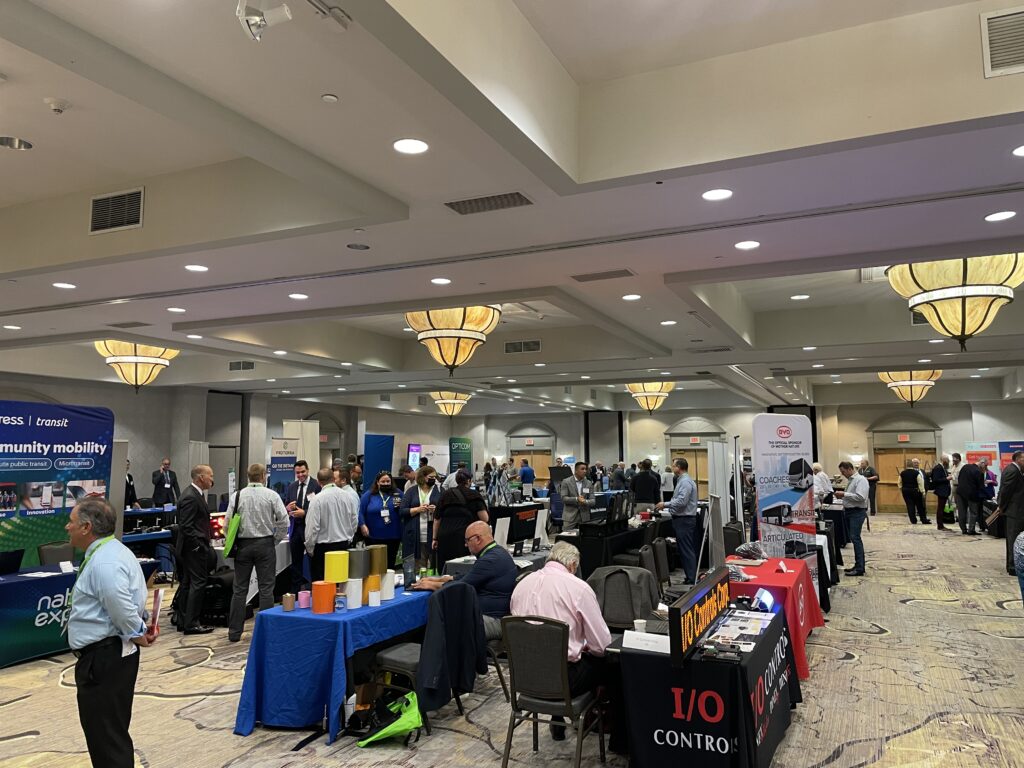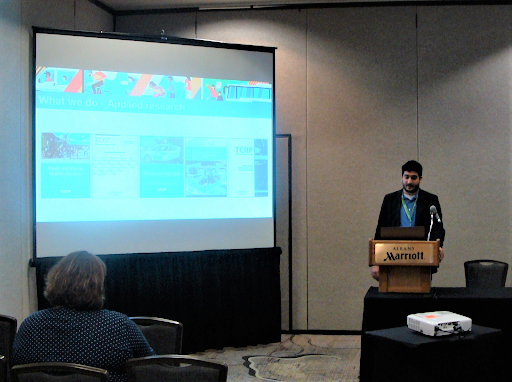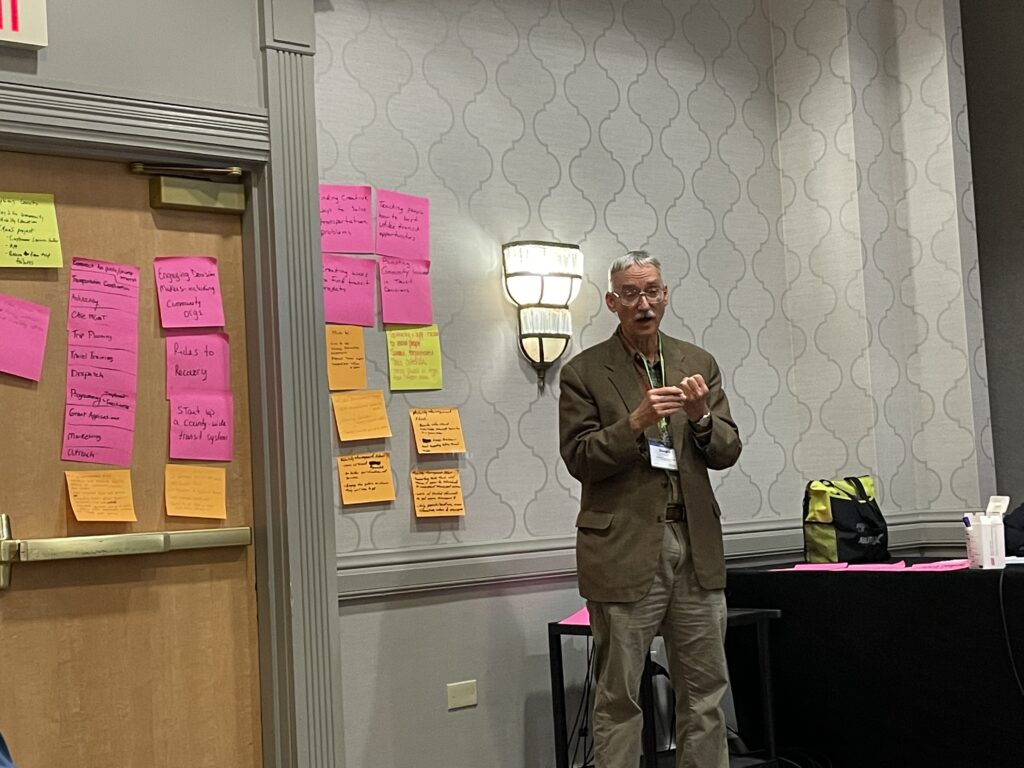Event Recap: NYPTA’s Mobility Innovation Conference in Albany, NY
By Shared-Use Mobility Center
Nov 15, 2022
Revised March 2025
Introduction
On October 26th and 27th, 2022, transit agencies from across New York gathered in Albany for the New York Public Transit Association (NYPTA) Mobility Innovation Conference. The event, sponsored by NYPTA, Federal Transit Administration (FTA) Region II, and the New York State Department of Transportation Rural Transportation Assistance Program, was a forum for agencies to present on their programs and learn from each other about innovative trends in the transportation industry both within and outside of New York.

Photo: Hani Shamat
The Shared-Use Mobility Center (SUMC) also had a presence at the conference, with Hani Shamat presenting during a session entitled “Innovative Transit Mobility Efforts: A Bird’s Eye View” on the Mobility Innovation Collaborative (MIC) program and highlighting various projects from grantees agencies of the FTA’s Innovative Mobility Integration (IMI) and Accelerating Innovative Mobility (AIM) programs. In addition to presenting on the background and history of the MIC program, he shared insights from the Bay Area Transportation Authority’s (BATA) transition to an on-demand microtransit service, the Baldwin County Regional Transit System’ (BRATS) rural microtransit project, River Cities Public Transit’s (RCPT) non-emergency medical transportation partnership, and the Crawford Area Transportation Authority’s (CATA) rural bikeshare program.
In the same session, Frank Doldo, Regional Mobility Manager from the Volunteer Transportation Center in St. Lawrence County, Oswego County, and Watertown, NY, discussed how the Volunteer Transportation Center promotes independence to residents of northern New York with few or no transportation options by providing essential rides to healthcare facilities, social services, and other destinations. (For more on volunteer driver programs, and to read about one such program in Minnesota, click here)

Photo: Cara Marcus
Key Takeaways
Below are a few takeaways from the event.
A holistic perspective is essential to running a transit agency
The first keynote speaker was Clinton B. Forbes, Executive Director of PalmTran in Palm Beach, Florida, who spoke about his journey, his leadership style, and how he worked to make PalmTran more customer-friendly. A key takeaway from his presentation was on his efforts throughout his career to observe each department in an agency and get to know all employees within an organization. This holistic approach opens the door for a full and thorough understanding of how an agency runs, fosters a close-knit community within the agency, and can highlight pain points within the organization that may not have been previously apparent.
Workforce retention is still an issue, but creativity can be a boon
The great resignation is still affecting the transportation industry, and agencies are working hard to come up with innovative solutions to recruit and retain transit workers. On a panel about challenges and successes in workforce development, representatives from Transdev, the Rochester-Genesee Regional Transportation Authority, the Capital District Transportation Authority (CDTA), and the Niagara Frontier Transportation Authority (NFTA) discussed some of their initiatives, including a CDTA interactive job fair where prospective bus operators could get behind the wheel for a test drive, and a NFTA program partnering with unconventional sources, like local sheriffs’ offices and parole boards, to find potential recruits to address the worker shortage.
The future of rural mobility is bright
Though attendees represented a variety of agencies throughout New York, a major theme throughout the conference was rural transportation and the unique challenges rural agencies face. Cara Marcus, Knowledge and Resource Manager at the National Rural Transportation Assistance Program (National RTAP) presented on the National RTAP’s resources and technical assistance tools that agencies can use to further their rural programs. Among those resources is the Technical Assistance Coordination Library (TACL), a FTA-funded resource library from the FTA and its technical assistance centers on a variety of transportation-related topics. TACL is a free and user-friendly platform with a large collection of rural and tribal transportation guides, webinars, case studies, research, and other resources. Later, Dwight Mengel, Chief Transportation Planner at Tompkins County Department of Social Services, led discussions on mobility management, what the future of rural transportation might look like, and what emerging technologies – for example, the what3words geospatial coding system – can offer.

Photo: Hani Shamat
Conclusion
In addition to representatives from transit agencies throughout New York, the conference brought together technology vendors, technical assistance centers, mobility managers, and other transportation industry professionals from around the country. Knowledge sharing is invaluable for innovation in the mobility industry, and in-person events like the NYPTA Mobility Innovation Conference foster discussions, networking, and dissemination of ideas not fully possible through other means.
Send questions, comments, and recommendations to: mic@sharedusemobilitycenter.org.
Stay up to date about details of upcoming events and trends in the mobility industry by subscribing to SUMC’s Mobility Hub Newsletter.